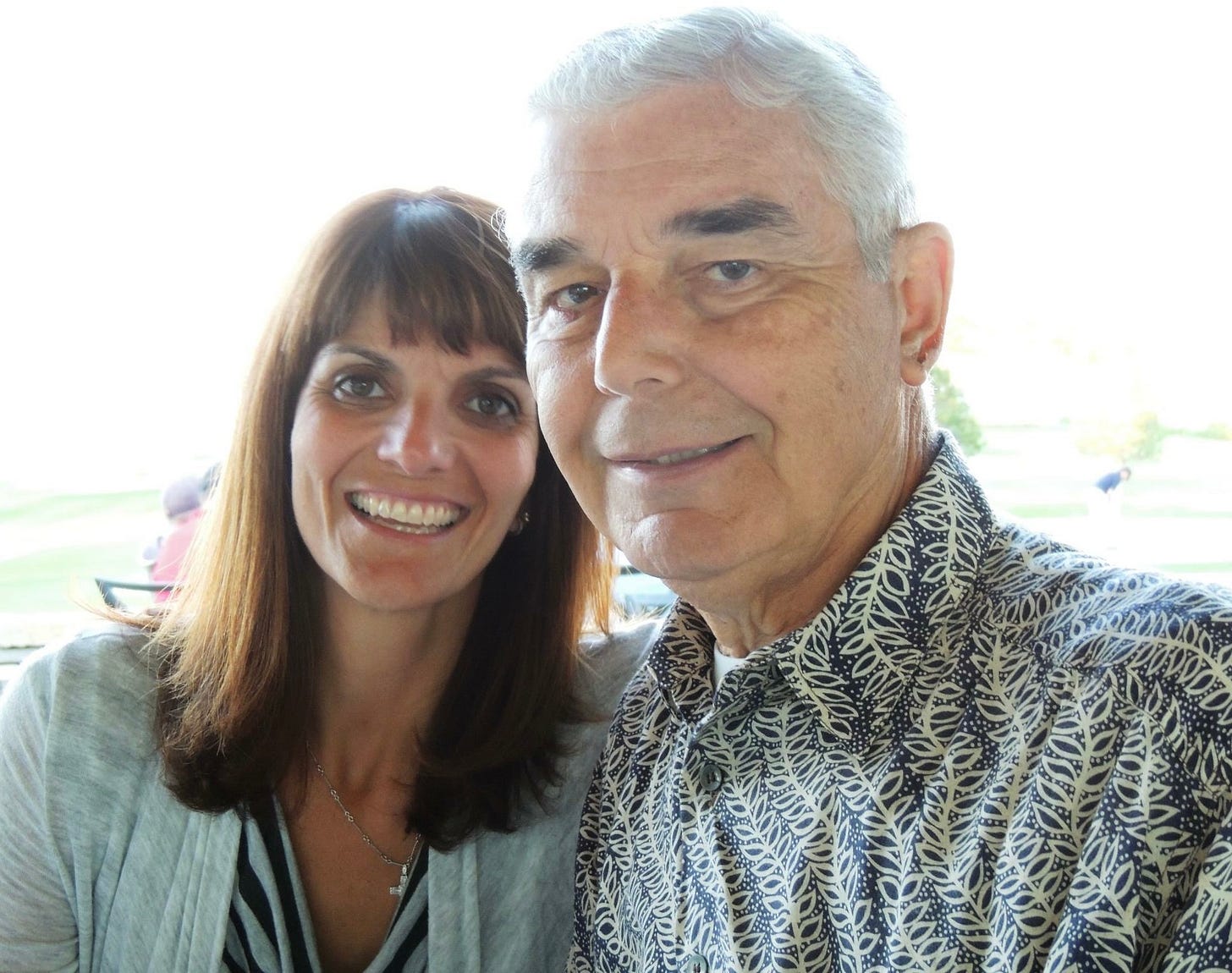Remembering A Great Man On Father's Day
Today is the third Father’s Day without my Dad. The loss is still as significant as the day he died in October 2021. While there is a common belief that ‘loss gets easier with time,’ the few years without him taught me only that loss gets ‘less hard.’
Semantics, perhaps, but there’s nothing easy about losing a loved one or learning to live without them, especially someone who helped form who you are.
Today, to honor the great man and father he was, I’m sharing six lessons he taught me about life.
1. Live in truth to find your truth
My father touched the lives of thousands of people, but none more than his family.
A devoted son, husband, father, uncle, and cousin, he gave selflessly to all. He also devoted himself to his patients, colleagues, and the medical profession, to which he dedicated more than sixty years.
He lived his life in an unassuming manner, helping all he knew along the way.
He helped me find my truth by living his.
Known for his kindness, generosity, intellect, compassion, and wisdom, he lived every aspect of his life truthfully.
A quiet truth.
He was never bold or loud. He didn’t preach or boast about his accomplishments. He didn’t need to, and it wasn’t in his nature.
He was confident in his abilities and used his gifts in their highest form—to help others.
When I questioned my abilities, I was reminded to consider my capabilities and gifts.
He didn’t give me the answers; he taught me to live truthfully and find the answers for myself.
2. Look inward to understand yourself
Swiss psychologist Carl Jung, known for his theories about the unconscious — our personalities, dreams, and intuitions, believed that to develop a “true self,” you had to distinguish your identity from the collective/ whole.
Jung’s theories called people to examine their individuality by looking inward, just as my father asked me to reflect on my abilities to find my way in life.
My father taught me to look inward to develop the clarity and insight needed to live purposefully.
Because when you understand yourself and your place in the world, it’s easier to understand what you were meant to do or be.
Finding that clarity often takes time and effort, but it’s possible and well worth it.
3. Have faith and never lose hope
When my son became ill, my father accompanied me on endless appointments and joined me in my search for answers. He and my mother were both pillars of strength for me.
They gave me faith when I lost mine and inspired me to believe there was an answer when I doubted I could find it.
They never lost faith.
They were right.
We often question our abilities and faith and lose hope when we need it most.
When my brother was diagnosed with childhood cancer at 2, my parents did everything they could to find answers and treatment to sustain his life. Everything they thought they knew was called into question. Years later, they told me they never lost faith.
They didn’t explain how, but they explained that their faith carried them through one of life’s challenging times.
Some would say my brother’s healing was a miracle - one of the first children to be healed from what was then an incurable type of childhood cancer. He would go on to marry and have children and grandchildren.
Miracle or not, I don’t know, but my parents taught me to have faith in myself and hope for the future despite the challenges that lay before us. Through their actions, they showed me that this was possible.
It’s how I survived the darkest times in my life so far.
4. Live in the present; establish a legacy for the future
A legacy is made through character, reputation, and the treatment of others. For some, a legacy is an integral part of life.
Have you considered how you want to be remembered?
We all want to leave a positive impact, especially on those we love. Some want to leave a far greater mark.
I started The Power of Change because I hoped to inspire others to transform their lives in meaningful ways. I wanted to restore hope to those who had lost theirs due to challenging times.
But most of all, I want to be remembered by my loved ones as a person who never gave up and never stopped living or loving those around her.
I want my son to remember the words I often repeat and share them with his children and grandchildren: “Believe you can because you are capable of achieving anything you set your mind to.”
I want him to remember he comes from a long line of strong, resilient men and women who never gave up.
However, to establish a legacy or be remembered in a special way, you must first live your life how you want to be remembered.
At the time of my father’s death, I located the handwritten notes he left me in the top drawer of his desk, an outline of his professional life. He asked me to write his obituary, a request I was honored to uphold.
I did my best to tell his incredible life story, capturing his outstanding accomplishments and highlighting his legacy.
But when I think about my father’s legacy, I remember how he lived each day.
He focused on the task at hand or the person sitting before him.
He didn’t dwell on the past. He forgave easily, even those who may not have deserved his forgiveness. He also didn’t worry about the future; if he did, he never made it known.
He lived in the present and taught me to do the same. In a quiet, unassuming way, he taught the most significant lessons by how he lived.
The outpouring of love after his death was remarkable but hardly surprising. Calls, cards, and donations to his chosen charity, The Dana Farber Cancer Research Center, continued for more than a year.
When I meet a former patient of his now, they always share their heartfelt memory of him.
My father lived each day to the fullest for himself and the people he loved and cared for.
I try to do the same. I’ve struggled at times, but I learned that by focusing on the present, I could move forward more confidently and worry less about the future.
Others will decide whether I leave a legacy. Choosing to live in the present moment is the only thing I can and do control.
5. Practice gratitude
“Gratitude is not only the greatest of virtues, but the parent of all the others.”
-Marcus Tulles Cicero, Roman philosopher
More than 2000 years after Cicero spoke these words, his theory continues to be widely shared by scientists, psychologists, and sociologists alike.
My father taught me the importance of gratitude throughout his life.
Before I was born, my father was hit head-on by a drunk driver and nearly killed. He was lucky to be alive. The accident left him with severe injuries and a long, painful recovery. He was a young dentist with two small children. The treatments available provided little comfort, and he suffered from terrible headaches, back and neck pain for most of his life.
As a teenager, I asked him about the accident and how he overcame this challenging time. He told me he just kept going. He didn’t have a choice.
He tried everything possible to alleviate the pain, and doctors told him he would suffer for the rest of his life. He didn’t accept that and continued to try new therapies. Ultimately, what worked for him was a regular exercise program with weights. For the rest of his life, at least four times a week, he would head down to our basement and use the weight machines and free weights he found helpful. He remained consistent with this program for sixty years. Of course, there were times I knew he was in pain and suffering, but he rarely complained.
He told me he was thankful to be alive and able to work and support his family.
With gratitude comes the ability to be present. By focusing on the present, you don’t look back at what was or forward to what may never be.
Just as I learned gratitude for the simple things in life after becoming ill, my father learned to be grateful for his ability to work despite the pain.
Living in the present moment and practicing gratitude also builds resilience. It did for me and certainly did for my father.
6. Live your truth
After watching me struggle with my illness for years, my father understood more than most that living with an invisible illness takes its toll and changes one’s life.
He encouraged me to write about my experience, believing I could raise awareness and help others. He told me my story mattered.
After his death, I lifted the veil that kept my illness and twenty-five-year journey under wraps and began sharing my story.
I began to live my truth.
I soon realized how many people could benefit from me living my truth. I learned most patients with chronic illnesses were suffering in silence, isolated from others due to their conditions. Sharing my story opened the door for them to reach out and connect.
My father was right when he told me my story mattered.
I remember my father with love, gratitude, and pride every day. He was the most extraordinary man I knew, and I was so lucky to have called him Dad.
Until next week, be well and stay mindful.
Tracy xo





From one Daddy’s Girl to another, my heart is with yours. Thank you for sharing his wisdom with us. Big time massive (((hugs)))
I have had the pleasure of knowing Tracy, her mom and her son, and to a lessor extent her Dad, through the same church we attended. I know for a fact that Tracy’s Dad was very much admired by many people and families in our community. He had a reputation beyond reproach. Like me, Tracy was blessed with a ‘great Dad’. What a gift we had. Happy Fathers Day ❤️